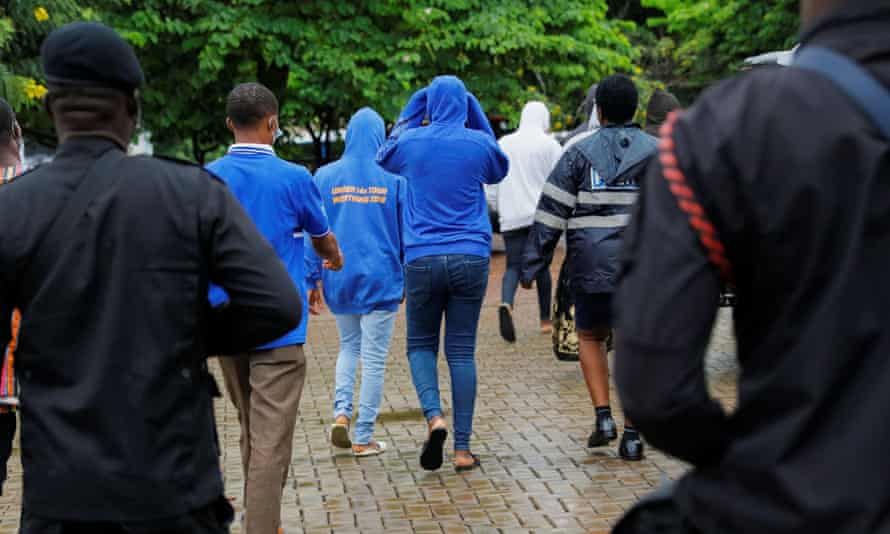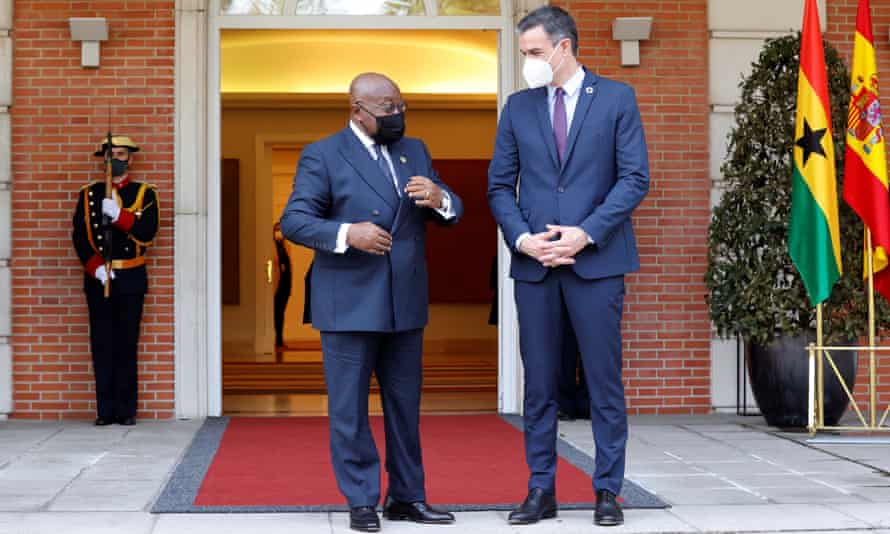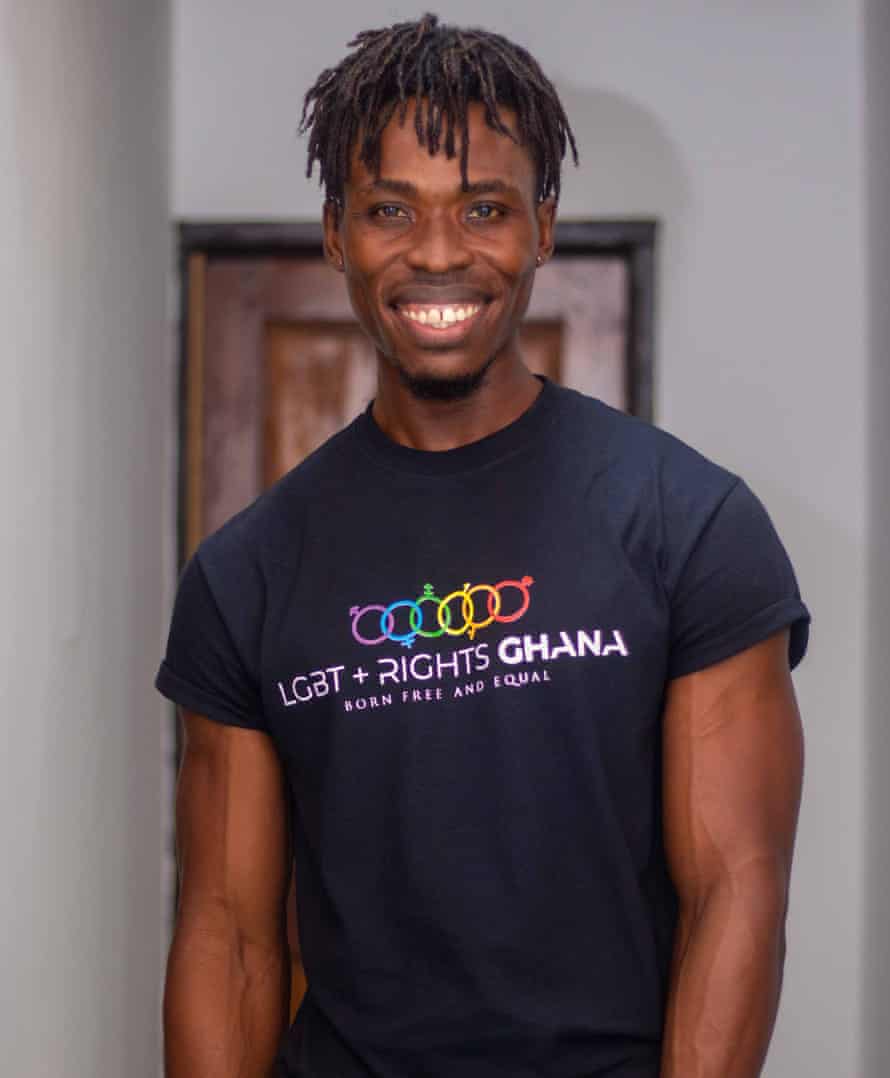Arrested, abused and accused: wave of repression targets LGBT+ Ghanaians
Opening of community space in Accra, which was quickly shut, has been the trigger for new anti-LGBT+ action

“All I wanted to do was help vulnerable people,” said Shaun Apong, tears streaking down his face, from behind the bars of a squalid police cell in Ho City in eastern Ghana.
Apong was one of 21 people arrested in early June, charged with unlawful assembly and accused of spreading an LGBT+ agenda, amid a marked and sudden increase in sensitivities around the rights and advocacy of gay and queer people in the west African country.
For years, Apong (not his real name) had held training sessions for paralegals, activists and care workers on how to support vulnerable groups. “We were never afraid to conduct the training because we aren’t breaking the law,” he said.
Apong and the others were arrested during a training session after police were called by local journalists. “They were acting as if we were criminals caught in the crime,” he said, with the reporters harassing attendants and taking pictures of their faces. Pamphlets and books, such as one encouraging parents of LGBT+ people to love their children despite their sexuality, were held up as evidence of a “gay agenda”.
The accused were repeatedly denied bail for three weeks before being released at the end of June pending a trial. Many, including Apong, are now spending their freedom in secret safe houses outside the city. With each week, the toll of the ongoing case mounts, under the glare of national attention.
Ho, a hilly, gently paced city with lush green landscapes, is now the scene of a landmark trial that has caught national attention in Ghana – and upended the lives of those involved.
“I have a business, a family who knows who I am; after this I can survive, but many of these people have lost everything,” Apong said in a second interview from his safe house. “Some of them have been abandoned by their families. One woman’s husband told her never to come home. What about her children? Six of them have kids. Some have already been told by their employers don’t bother coming back to work”
Since early this year, a sudden and chilling wave of repression against LGBT+ people has quickly turned a fraught but negotiable environment for gay and queer advocacy into something more dangerous.
Politicians, Christian and civil groups have led a wave of protest against the rights of sexual minorities in the country, after the opening of a community space in the capital Accra in January. In February the space was shut down, and ever since, arrests of LGBT+ advocates and incidents of abuse have been rising.
The outrage over the community space, fanned by figures capitalising on anti-gay sentiment, may result in lasting change. Lawmakers and government officials in President Nana Akufo-Addo’s administration have vowed to pass new anti-gay laws.
Addo, widely courted by western governments, is often cast as a liberally inclined pro-democracy figure in a region beset by political instability and repression. Yet western diplomats and rights advocates have been urging his government to row back on anti-gay rhetoric, and to scrap proposed anti-gay legislation that would reshape perceptions of his administration.

A group of eight lawmakers, led by Sam George, have proposed new anti-gay laws, submitted to parliament on 29 June. “The promotion of proper human sexual rights and Ghanaian family values bill” would be a “landmark legislation” criminalising the advocacy and act of homosexuality, George said.
“Unnatural carnal knowledge” – often interpreted as non-heterosexual sex – is unlawful in Ghana. Prosecutions are rare, yet experiences of the justice system are often in themselves punishing.
In the case against the 21 accused in Ho, as well as denying their bail, the judges continuously adjourned the hearings, leaving the defendants in despair. At hearings, prosecution lawyers cited finding condoms as part of the evidence against the accused. “They were making strange arguments that don’t even make sense,” said an activist at one of the hearings. “Is a condom evidence of criminality?”
In March, a letter signed by Naomi Campbell, Idris Elba and Vogue editor Edward Enninful criticised the treatment of LGBT+ people in Ghana amid global attention on the closure of the community space.
The proposed legislation in itself marks a turning point in Ghanaian life, said Fatima Derby, a feminist writer. “Even discussing the bill signals to people that this is something we need to stamp out,” she said from a cafe in Accra.
“This is maybe the worst period I’ve seen in Ghana, in terms of the safety of LGBT+ people. Many people are very fearful for their lives and their safety,” she said, adding that the events this year had had a chilling effect on various forms of activism in Ghana. “If five or six activists gather in a place like this, it feels like they could storm in and accuse us, too.”
Before this year, ordinary life for many gay and queer people in Ghana was precarious, but managed. “You would see queer Nigerians in Accra for fun,” said Phoebe (not their real name), a non-binary 27-year-old health worker.
“People in Ghana had this idea of ‘Yeah, this person is gay, that person is gay,’ but there was like a distance to it. You do you, I do me,” they said. “There was abuse, for sure, so many dangers, but on the whole, compared to some places, it felt manageable. Now, even to go out to certain places, you’re second-guessing yourself, like, maybe it’s not wise any more.”
Images from the opening ceremony for the Accra community space spread rapidly, some showing the Australian ambassador to Ghana in attendance. They fuelled two linked sentiments that are common in Africa: that LGBT+ groups are establishing a more institutional presence, and that homosexuality is a western construct, despite the long history of multiple sexualities in many African cultures.
Among some advocates, the presence of western officials raised questions about the risks of visible western support for LGBT+ causes in Africa.

The uproar in Ghana over the community space felt unprecedented, said 28-year-old Alex Kofi Donkor, who founded the group that had set it up.
“It was all over TV, the radio stations, talkshows. Politicians, traditional leaders, everyone was being asked about it, knowing that if they don’t say the right answer – that it is wrong, it should be stamped out – they would be made a target,” Donkor said. Yet the outrage also presented an opportunity and spurred activism. “That was the first time we were having a national conversation about LGBT issues, talking to the media squarely.”
For months Donkor has been publicly and fiercely defending LGBT+ rights in Ghanaian media. The approach taken by Donkor’s organisation highlights a significant divergence among activists in repressive countries. Many groups that work on LGBT+ rights in Ghana do so discreetly, organising under more ambiguous or generic causes.
“There’s a generational change. There is this backdoor, quiet approach, then a more confrontational approach, by a younger generation who are more specific about what they want,” Donkor said.
“Some older activists are saying, ‘Maybe be quieter, maybe do things more carefully,’ but people are tired and want to speak out. They don’t want to make subtle steps when in reality their lives are on the line.”

No comments:
Post a Comment